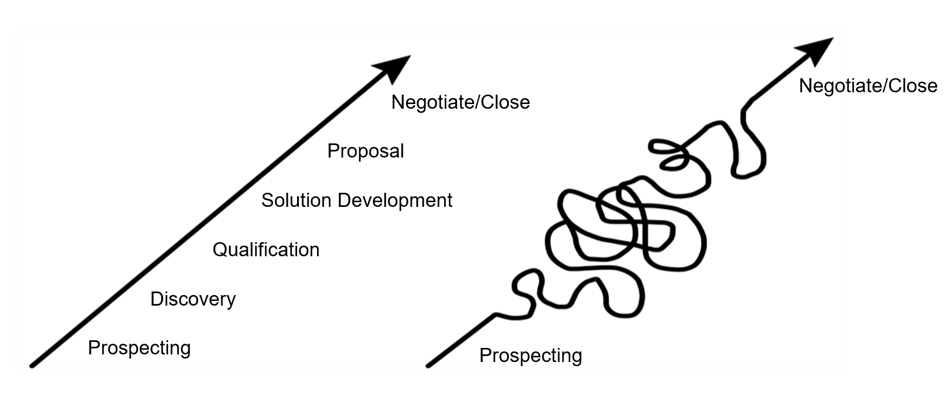Let’s face it, your Sales Methodology is Broken
No need to confess, we know the truth. You spent a king’s ransom to license an off-the-shelf methodology. Or equally painful, you devoted countless hours and resources to build your own. But here you are, months or years later, battling low adoption and poor sales results.
It’s time to face the hard reality. It’s not the implementation model. Or the sales enablement strategy. Or even the level of leadership buy-in. The truth is, your sales methodology is broken because it doesn’t match today’s buying.
A growing body of research from Brevet and academics shows that methodologies are too static and linear. This structure looks logical on a PowerPoint slide, but it fails in practical execution. The straight, progressing line has been replaced with a tangled “rat’s nest” of selling motions.
This change is driven by three increasingly common trends that define the current sales environment:
- Buyers struggle to accurately frame their issues – Our deal benchmarks show that prospects misdiagnose their problem up to 90% of the time. Reps are spending much more effort pushing buyers back in their process, reframing the issues and concerns. These activities require iterative and circular selling actions.
- Smaller deals involve more decision-makers – Mirroring research from others, Brevet’s deal-level data prove the consensus buying trend is real. More importantly, the number of decision-makers is growing while average deal sizes are decreasing. Linear methodologies fail to capture the complex and disjointed tactics needed to align multiple stakeholders.
- Integrated solution deals are shrinking – Buyers are increasingly avoiding risk while at the same time struggling to manage budget priorities. In response, our benchmarks show prospects are buying fewer large solution bundles. Instead, they are embracing smaller deals that build to the larger solution over time. Often these multiple contracts are with the same supplier. A single opportunity has become four or five related deals, each requiring unique selling motions.
These trends show why many firms are replacing linear methodologies with a more adaptive process. And other companies that are implementing their first sales methodology are also following this new strategy.
A situation-based methodology builds on the best practices of your top performers. This group has traditionally been the least likely to embrace standard sales methodologies. They know that one size doesn’t fit all when it comes to selling. They pattern-match certain deal cues to specific sales plays at the right moment. Situational adaptability in the face of unique and complex deals is the key to success.
The best sales organizations are scaling this individual high-performer skill using adaptive opportunity management. An adaptive approach requires a new mindset about sales methodology. Gone is the linear, one-size-fits-all model. In its place is a data-driven system that covers training, messaging, coaching and reinforcement. This is a true sales methodology.
Deploying adaptive opportunity management is challenging, but the results can be dramatic. Time-to-close is reduced while average deal sizes are increased. Sales enablement teams are more focused, delivering more targeted support. Sales coaching is practical because it is contextualized and relevant to the deal. Most importantly, the field views methodology as a performance support tool rather than a compliance metric.
Contact us to begin building this new sales methodology. It starts by benchmarking your deal characteristics. It then goes into understanding the benefits of revamping your methodology to be more adaptive. We can also share our process for deploying your first methodology using the principles of adaptability. All of which will create improved deal sizes and increased deal velocity - key actions needed to achieve your revenue goals.
About The Author
 Researcher, consultant, and sales leader, Brian uses a data-driven approach to drive sales effectiveness. His clients include leading sales organizations in financial services, technology, healthcare, and professional services. Using insight from academics and change management, Brian helps senior leaders and sales enablement teams understand and succeed in today’s more demanding market. His research has been published in Harvard Business Review and other outlets.
Researcher, consultant, and sales leader, Brian uses a data-driven approach to drive sales effectiveness. His clients include leading sales organizations in financial services, technology, healthcare, and professional services. Using insight from academics and change management, Brian helps senior leaders and sales enablement teams understand and succeed in today’s more demanding market. His research has been published in Harvard Business Review and other outlets.




